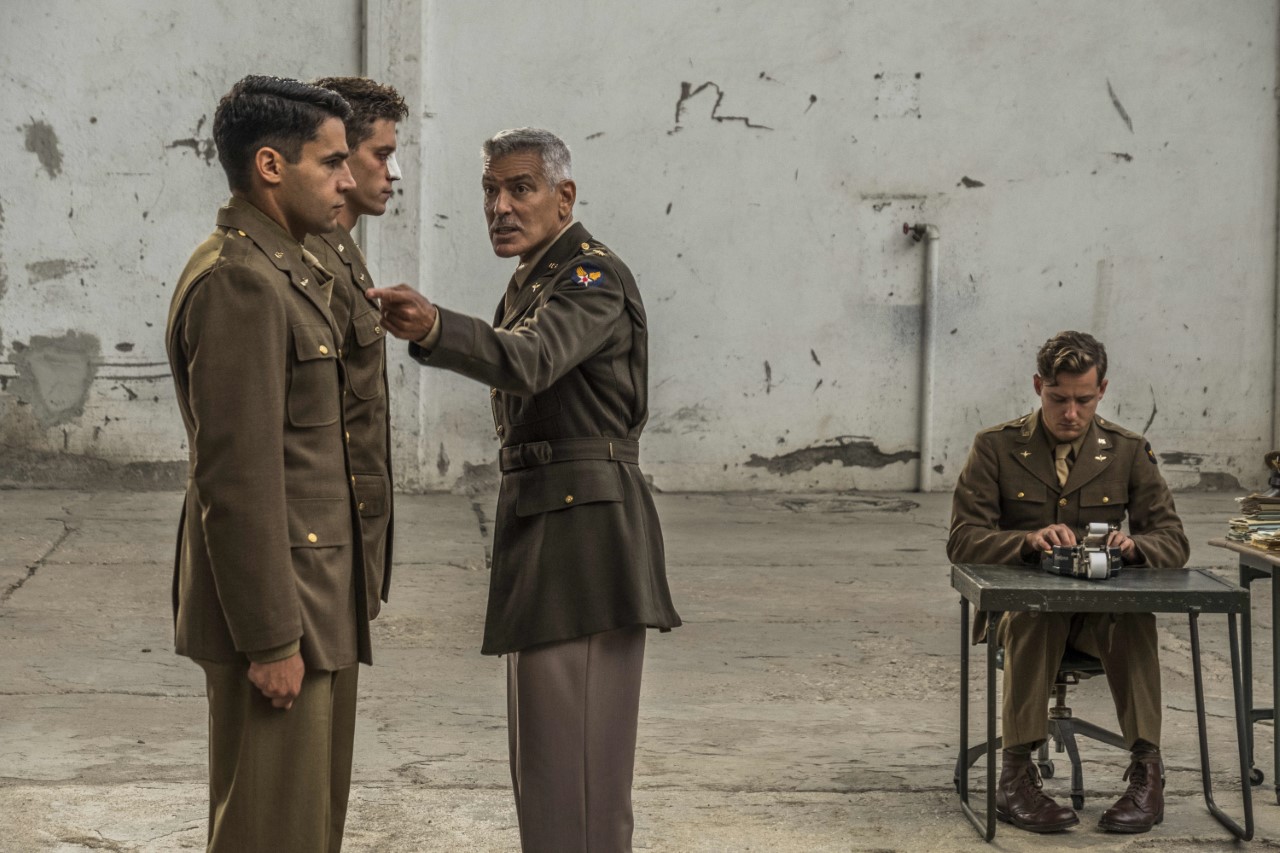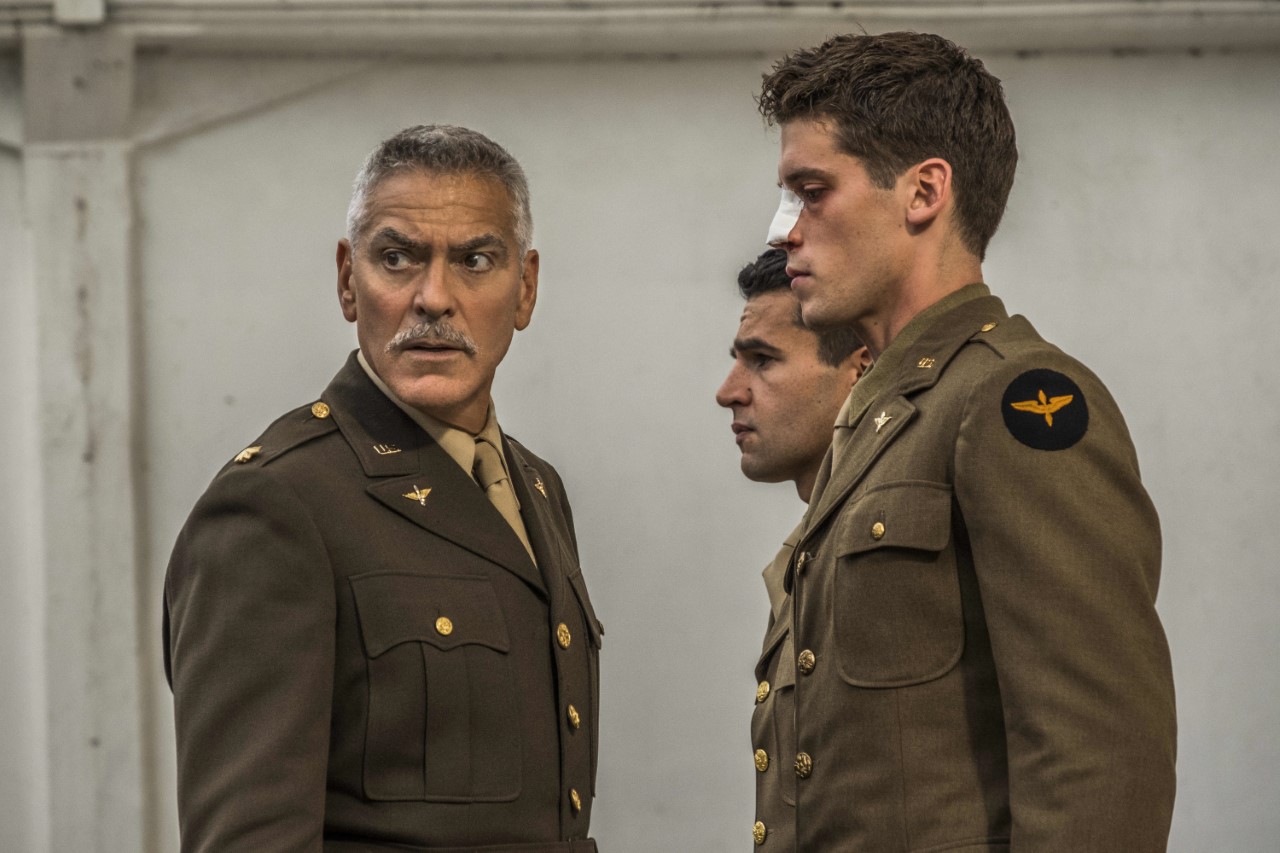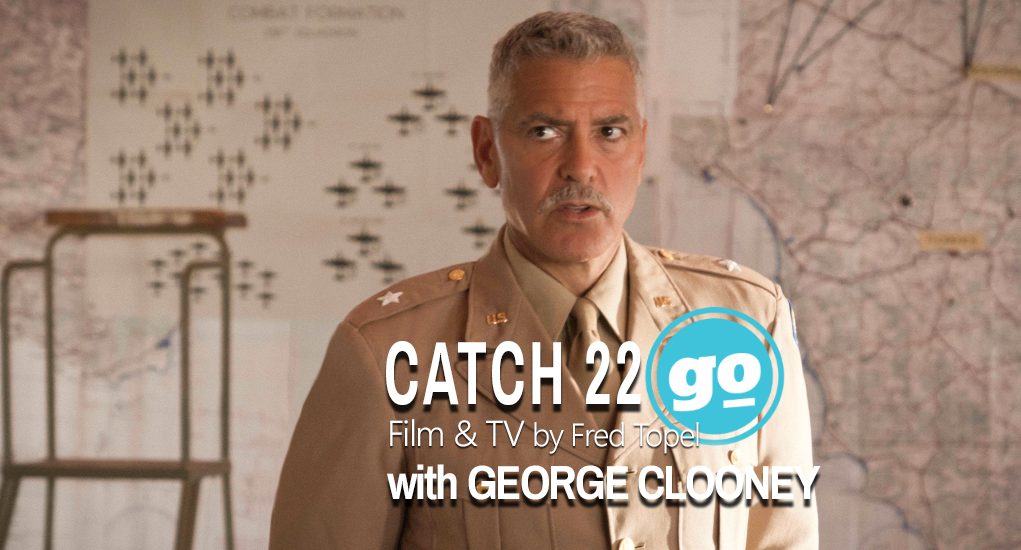Catch-22: George Clooney Q&A
By Fred Topel.
We often use the term catch-22 to describe situations where we can’t get out of circular logic. It comes from the novel Catch-22 by Joseph Heller in which a military pilot wants to get out of combat by being declared insane, but wanting to get out of deadly combat is proof of his sanity. It’s a Catch-22 and Mike Nichols directed a feature film adaptation in 1970 starring Alan Arkin.
Well, it’s nearly 50 years later and Catch-22 is still relevant. So George Clooney is producing a Hulu streaming series adaptation of Catch-22, directing two episodes and starring as a commanding officer. Clooney was on a Hulu panel for Catch-22 and Gonzo even got to ask him a question. Catch-22 premiers on Hulu May 17.

Gonzo: Do you find that a lot of people know the term Catch-22 but don’t quite entirely know where it means or where it came from?
GC: Isn’t it funny you say that? It’s a funny thing. I didn’t know that Catch-22 actually originated from the book. I thought it was just a term that’s always been there. Heller actually made up the term. It was originally called Catch-18 and then he changed it to Catch-17 and then Stalag 17 came out and then he changed it to Catch-11 and then Ocean’s 11 came out so then he changed it to Catch-22. I didn’t really know that it wasn’t part of the lexicon before that.
Q: Did you use it a lot before you knew?
GC: Of course. I do it all the time.
Q: When did you first read the book?
GC: I think it was high school. I think a lot of us of a certain age that was one of the books they gave you in high school that you were supposed to read, you know Catcher in the Rye and Catch-22. This is considered one of the great American novels of all time. So, it was required reading when I was in high school. And I loved the style of writing which was different than the kind of writing we had read. But I was pretty young, and so I just liked the character, and I thought it was fun. I reread it when we were sent the scripts to do, and I hadn’t read it in, you know, high school was 15 years ago. [joking] I hadn’t read it in a long time. So it was really fun and exciting to go back and read and understand why this book lasted and stands the test of time. It was fun.
Q: How do you know when you want to direct something?
GC: When the script feels right. That’s when you do it because it’s two years out of your life. Any way you do it, it’s two years out of your life.
Q: Why do Catch-22 as a series?
GC: It’s a big novel. It’s one of the 20 biggest novels and most important American novels in the world so it was daunting. The only reason to do it was because they wrote a good script. But the reason, we were sent the first three scripts. It’s six episodes. We were sent the first three scripts Grant [Heslov] and I, and they said, “Do you want to do Catch-22? And we said, “No, I don’t want to do Catch-22.” It seems ridiculous. It’s a beloved novel. I don’t want to get into the middle of all that. And we read these first three scripts and I said, “Well, if the next three are anything like that…” And we read the next three, and then we called up everybody at Paramount first and just said, “Where do we sign up?” We just loved the scripts. When you do a movie, as you know, you don’t have enough time to really get to know the characters, and that’s why you do this as a television show, is you get to spend time with the characters like the book does. And they just figured out a way to interpret it in a way that we didn’t think was really possible. So, I think that’s why we got onboard, for the most part.
Q: How did you strike the tone in your performance?
GC: Well, you got to take a swing. You have to take a swing and hope that you hit the ball along the way, and sometimes you do and sometimes you don’t. We felt like this one, there’s no way you can do this half-assed, right? You got to go for it. If you read the characters, if you read the script, you can’t subtly yell at people along the way, and you can’t subtly kill these people. It’s a pretty gruesome business, war is, and so there’s a morbid comedy to it as well.
Q: Are you worried about anyone having a negative reaction to satirizing “The Greatest Generation?”
GC: Well, Army people are the first people who like these stories, because you’re also making fun of the higher-ups. It’s more about the bureaucratization of military and war, I think what Heller was doing originally, because he was writing in response to Korea, not to World War II, and it was taken up by the Vietnam generation as it became an antiwar book. But that wasn’t what it was designed to do. It was really to make fun of all of the red tape and the bureaucracy of war and the ridiculousness of it. And so I think that that still plays. You’ll have to see the rest of the episodes to see if it still plays or not, but I think it does.

Q: Is this a sign of you coming back to television? And would you like to direct a show you don’t have to act in?
GC: I’ve done that a few times. Most of the time, you’ll have to act in something somewhere along the way. We’ve always been involved. Grant and I have always been involved in television where we did a live version of Fail Safe and we had five or six television series over the years. I don’t care about the medium. I really don’t. I just care about the quality of the work, and the things that we’re able to do. And television’s doing some really amazing things. We have a Watergate piece that we’re working on right now and an eight-part piece on Watergate. We just want to work.
Q: How are you as a director, producer and actor more aware of women in the workplace after the MeToo/Times Up movement?
GC: Well, it was interesting. Originally Grant and I were directing it ourselves. We looked around and we thought, “Well, this takes place in 1944 and it’s all men. We should actually do everything we can to involve women.” We were already sort of into it. We called up Ellen [Kuras] and Ellen said she’d love to come on board and direct, so I gave her two episodes of ours that we had. She did an amazing job. We felt like we wanted to get more of a woman’s perspective in everything. Our editors are women. We wanted there to be a feeling that it isn’t just from some 57-year-old guy’s perspective.
Q: What do women bring to it?
GC: Certainly a different kind of logic. It’s streamlined and a great logic. And it’s just a good director. It has nothing to do with gender but it also feels important to make that we’re all participating in this and we’re all part of the solution and not part of the issue.
Q: How do you feel about Grey’s Anatomy beating ER as the longest running medical drama?
GC: That’s gotta stop. We’ve gotta go back and do some more.
Q: Would you think an ER reboot is a good idea?
GC: I would play a patient now.
Q: How do you look back on doing ER 25 years ago?
GC: Well, it’s been a while, I suppose. ER was a nutty moment in my career, but also in the lives of a bunch of actors. There were six of us who suddenly were thrust the stratosphere, and it was life-changing for all of us. And it was fun to be here.
Featured photo by: Philippe Antonello/Hulu








